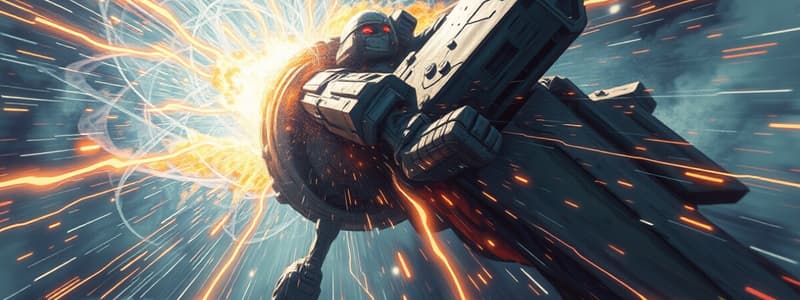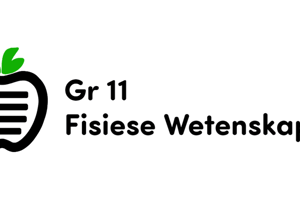Podcast
Questions and Answers
What is the cause of acceleration?
What is the cause of acceleration?
A net force not zero
What is a combination of all the forces that act on an object?
What is a combination of all the forces that act on an object?
Net force
Forces of 14N and 6N in the same direction act on an object. What is the net force on the object?
Forces of 14N and 6N in the same direction act on an object. What is the net force on the object?
20N
If the forces on an object are 3N in one direction and 15N in the opposite direction, what is the net force exerted on the object?
If the forces on an object are 3N in one direction and 15N in the opposite direction, what is the net force exerted on the object?
If the force on an object doubles, then the acceleration will?
If the force on an object doubles, then the acceleration will?
To find the net force on an object when two or more forces are pushing or pulling in opposite directions, you must?
To find the net force on an object when two or more forces are pushing or pulling in opposite directions, you must?
To find the net force of an object when two or more forces are pushing or pulling in the same direction, you must?
To find the net force of an object when two or more forces are pushing or pulling in the same direction, you must?
Twice as much mass = _____ the acceleration
Twice as much mass = _____ the acceleration
If the net force of an object doubles, then the acceleration _____________
If the net force of an object doubles, then the acceleration _____________
If the mass of an object doubles, the acceleration is _____
If the mass of an object doubles, the acceleration is _____
If mass and force both double then the acceleration is _____
If mass and force both double then the acceleration is _____
What happens to acceleration if a load is added to the cart so that its mass is doubled?
What happens to acceleration if a load is added to the cart so that its mass is doubled?
What is a force that always acts in a direction to oppose motion?
What is a force that always acts in a direction to oppose motion?
If you push something to the right, the friction always goes to the?
If you push something to the right, the friction always goes to the?
What is acceleration?
What is acceleration?
What kind of relationship exists when one variable increases and the other also increases?
What kind of relationship exists when one variable increases and the other also increases?
What kind of relationship occurs when one variable increases and the other decreases?
What kind of relationship occurs when one variable increases and the other decreases?
What does Newton's Second Law state?
What does Newton's Second Law state?
What is the relationship between mass and acceleration?
What is the relationship between mass and acceleration?
What is the relationship between net force and acceleration?
What is the relationship between net force and acceleration?
What is net force?
What is net force?
What happens to net force and acceleration at constant velocity?
What happens to net force and acceleration at constant velocity?
What type of force is friction?
What type of force is friction?
What happens to forces in the same direction?
What happens to forces in the same direction?
What happens to forces in opposite directions?
What happens to forces in opposite directions?
What is force?
What is force?
What is energy?
What is energy?
In the diagram which one has the forces balanced?
In the diagram which one has the forces balanced?
In the diagram which one could be traveling at a constant speed?
In the diagram which one could be traveling at a constant speed?
Which of these could be slowing down? (Select all that apply)
Which of these could be slowing down? (Select all that apply)
Flashcards
Cause of Acceleration
Cause of Acceleration
A non-zero net force causes acceleration.
Net Force
Net Force
The combination of all forces on an object.
Net Force (Same Direction)
Net Force (Same Direction)
Sum the forces.
Net Force (Opposite Directions)
Net Force (Opposite Directions)
Signup and view all the flashcards
Force Doubles, What Happens to Acceleration?
Force Doubles, What Happens to Acceleration?
Signup and view all the flashcards
Mass Doubles, What Happens to Acceleration?
Mass Doubles, What Happens to Acceleration?
Signup and view all the flashcards
Net Force Doubles, What About Acceleration?
Net Force Doubles, What About Acceleration?
Signup and view all the flashcards
Mass Increases, What About Acceleration?
Mass Increases, What About Acceleration?
Signup and view all the flashcards
Both Mass and Force Double.
Both Mass and Force Double.
Signup and view all the flashcards
Load added to a cart, doubling mass.
Load added to a cart, doubling mass.
Signup and view all the flashcards
Friction
Friction
Signup and view all the flashcards
Pushing Right, Which Way is Friction?
Pushing Right, Which Way is Friction?
Signup and view all the flashcards
Acceleration
Acceleration
Signup and view all the flashcards
Direct Relationship
Direct Relationship
Signup and view all the flashcards
Inverse Relationship
Inverse Relationship
Signup and view all the flashcards
Newton's Second Law
Newton's Second Law
Signup and view all the flashcards
Net Force
Net Force
Signup and view all the flashcards
Constant Velocity
Constant Velocity
Signup and view all the flashcards
Friction
Friction
Signup and view all the flashcards
Forces in the Same Direction
Forces in the Same Direction
Signup and view all the flashcards
Forces in Opposite Directions
Forces in Opposite Directions
Signup and view all the flashcards
Force
Force
Signup and view all the flashcards
Energy
Energy
Signup and view all the flashcards
Constant Speed
Constant Speed
Signup and view all the flashcards
Object Slowing Down
Object Slowing Down
Signup and view all the flashcards
Newton (N)
Newton (N)
Signup and view all the flashcards
Inertia
Inertia
Signup and view all the flashcards
Mass
Mass
Signup and view all the flashcards
Acceleration
Acceleration
Signup and view all the flashcards
Velocity
Velocity
Signup and view all the flashcards
Study Notes
Newton's Second Law Concepts
- Acceleration is caused by a net force that is not zero.
- Net force is the combination of all forces acting on an object.
- When forces of 14N and 6N act in the same direction, the net force is 20N.
- If forces of 3N and 15N act in opposite directions, the net force is 12N.
- Doubling the force on an object results in doubled acceleration.
- To find the net force when forces act in opposite directions, subtract the smaller force from the larger one.
- When forces act in the same direction, add their magnitudes to determine the net force.
Mass and Acceleration Relationships
- Doubling the mass of an object halves its acceleration.
- If the net force on an object doubles, the acceleration also doubles.
- An increase in mass inversely affects acceleration; if mass increases, acceleration decreases, and vice versa.
- If both mass and force double, acceleration remains unchanged.
- If a load is added to a cart doubling its mass, the acceleration is halved.
Force Dynamics
- Friction is a force that opposes motion and acts in the opposite direction of applied force.
- When pushing something to the right, friction acts to the left.
- Acceleration signifies a change in the motion of an object.
Relationship Principle
- A direct relationship means if one variable increases, the other does too; if one decreases, both decrease.
- An inverse relationship indicates that an increase in one variable leads to a decrease in another.
Newton's Second Law Definition
- Newton's Second Law states that the net force acting on an object produces an acceleration that is directly proportional to the net force and inversely proportional to the object's mass.
Force and Motion
- Net force is the sum of all forces acting on an object.
- Both net force and acceleration are zero when the object moves at a constant velocity.
- Friction is a resistive force resulting from surface interaction and always opposes motion.
Analyzing Forces
- Forces acting in the same direction are added together.
- Forces acting in opposite directions are subtracted from one another.
- A force is defined as a push or pull that can change an object's motion.
- Energy describes the ability to cause change.
Diagrams and Object States
- In diagrams, identify where forces are balanced and where objects may be traveling at constant speed or slowing down.
Studying That Suits You
Use AI to generate personalized quizzes and flashcards to suit your learning preferences.




